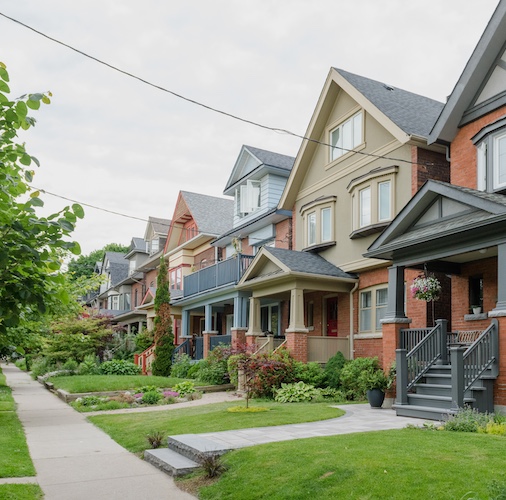How much house can I afford on a $70K salary?
Dec 10, 2024
•6-minute read
Many home buyers are curious about how much they can afford on a $70K salary. It's important to understand that buying a home isn’t only about your income. There are several other factors that come into play when determining how much home you might be able to afford. Additionally, there are assistance programs that are available for people trying to become homeowners, especially for first-time home buyers.
The quick answer: Between $180K and $350K
If you have a $70K annual salary, you might be able to afford a house with a value of around $210,000, based on the rule of thumb that says you can afford a house worth three times your annual salary. However, the exact budget range depends on other factors including credit score, financial situation, and the market conditions. Someone with a $70K salary might be able to afford a house with a value between $180K and $350K, depending on these factors.Estimating how much house you can afford with $70K a year
Home affordability is primarily determined by your annual or monthly income as compared to your potential house payment. When trying to determine how much house you can afford, the most important factor is how much money you make. Your annual income is a key part of deciding your home buying budget and how much house you can afford.
Here are a few steps that first-time home buyers can take to determine how much they can spend:
- Find your monthly income
- Identify your budget
- Determine your price range
You can explore different scenarios in our Home Affordability Calculator to learn more.
The 28% rule
Many people wonder what percentage of their income should go to a mortgage? Most mortgage lenders recommend using no more than 28% of your monthly gross income on a mortgage payment. In addition to that, many lenders also recommend that you spend no more than 36% of your monthly gross income on all your debt payments combined, including your monthly mortgage payment and other house costs.
Mortgage breakdown on a $70K salary
If you're looking for examples of what a housing budget looks like on a $70K salary, here are three different scenarios. In each scenario, we assume a 30-year fixed mortgage, an additional $250 a month for property taxes and insurance, and the maximum amount of mortgage that you can afford and still comply with the 28% rule.
Scenario 1:
- 6.5% interest rate
- $25,000 down payment
- Maximum monthly payment on a $70K salary: $1,633.33
- Property taxes and insurance: $250 / month
- Monthly principal and interest payment: $1,383.33
- Maximum mortgage amount: $219,000
- Maximum house value you can afford: $244,000
Scenario 2:
- 7.5% interest rate
- $20,000 down payment
- Maximum monthly payment on a $70K salary: $1,633.33
- Property taxes and insurance: $250 / month
- Monthly principal and interest payment: $1,383.33
- Maximum mortgage amount: $198,000
- Maximum house value you can afford: $218,000
Scenario 3:
- 7.25% interest rate
- $50,000 down payment
- Maximum monthly payment on a $70K salary: $1,633.33
- Property taxes and insurance: $250 / month
- Monthly principal and interest payment: $1,383.33
- Maximum mortgage amount: $203,000
- Maximum house value you can afford: $253,000
Factors that impact how much house you can afford
While your annual income is an important factor, there are also other factors that contribute to home affordability. Each of the factors below impacts how much house you can afford. Being aware of these factors can help you lower your mortgage payment.
Credit score
If you're wondering how your credit score affects your getting a mortgage, it primarily impacts your ability to get a mortgage and the interest rate you'll qualify for. While you'll typically need a credit score of 580 to 620, the higher your score is, the lower the interest rate you'll qualify for. That in turn will lower your monthly mortgage payment and allow you to afford a higher-priced house.
Down payment
Many lenders require a certain percentage of the home's value to be put down as a down payment. Lenders will typically only lend a maximum amount of money to borrowers, based on their income and other factors. So a down payment can impact your mortgage since the higher the down payment that you have, the more house you can afford.
Closing costs
It's important to understand that your down payment isn't the only money that you may need to bring to closing. There are also closing costs including title insurance, recording fees and other fees that you may be responsible for. Make sure you have enough money for these closing costs in addition to your down payment.
Debt-to-income ratio
In addition to the 28% rule, many lenders also have a 36% rule, which says that your total monthly debt payments (including your new mortgage) can't exceed 36% of your monthly income. So while there isn't a set limit on how much debt you can have when buying a home, your debt-to-income ratio (DTI) can affect how much home you're able to afford.
Current interest rates
If you're wondering how interest rates impact your home costs, the answer is quite a bit. The higher current interest rates are, the lower the value of a home that you can afford. Check today’s mortgage interest rates.
Mortgage terms
Different lenders and mortgages have different terms that affect your overall monthly payment. This is one reason why it's a good idea to shop around and compare different lenders and mortgage types to find the one that's best for you.
Location and amenities
As the old maxim says, the three most important words in real estate are "location, location, location". While $200,000 is likely to buy you a lot of house in the Midwest, it’s unlikely to get you much of anything in San Francisco or New York City. Even within regions and cities, the amount of house you can buy with a set amount of money can vary widely depending on the neighborhood and local amenities.
Maintenance and repairs
Owning a home can be expensive. In addition to your monthly mortgage payment, it is a good idea to make sure your budget has enough money for regular home maintenance and repairs. It’s suggested that you set an annual budget of 1% - 3% of your home’s price to account for these unexpected events. This is one reason lenders have instituted the 28% rule — to make sure that borrowers have enough money left in their budget for these ancillary costs.
Taxes and insurance
Property taxes and insurance vary wildly by location and are often escrowed as part of your regular monthly mortgage payment. The amount of property tax and insurance that you pay each month is considered part of your housing expenses for purposes of the 28% rule.Mortgage options for your $70K salary
Depending on your situation, there may be several different loan types and mortgage options that may be available to you.
Loan types
There are several different types of mortgages available to borrowers who make $70K a year. Here are a few of the most common:
- FHA: FHA loans are insured by the Federal Housing Administration (FHA), and often allow borrowers to buy a home with a lower credit score and/or lower down payment amount. You can get an FHA loan making $70K a year.
- USDA: USDA loans are insured by the United States Department of Agriculture. With a USDA loan, you may be able to buy a home with no money down. You must meet specific income requirements and your home must be in an eligible suburban or rural area in order to qualify for a USDA loan. Rocket Mortgage® does not offer USDA loans.
- VA: VA loans are insured by the Department of Veterans Affairs. To qualify for a VA loan, you typically must meet service requirements in either the Armed Forces or National Guard to qualify for a VA loan. VA loans can allow you to buy a home with $0 down and lower interest rates than most other types of loans.
- Conventional: Conventional mortgages are the most common type of mortgage. Generally, you can qualify for a conventional mortgage with a minimum credit score of 620 and a debt-to-income ratio of up to 50%.
First-time home buyer programs
There are many first-time home buyer programs that incentivize people trying to buy their first home. There are several first-time home buyer programs for people making $70K a year. These include government-backed loans, down payment assistance programs, tax deductions or closing cost assistance. Check with nonprofit agencies or lenders in your area to see what first-time home buyer programs might be available to you.The bottom line
Buying a home on a $70K salary is possible, but it may be difficult, depending on other factors like your credit score, the amount of money you've saved for a down payment, your debt-to-income ratio and the housing market where you live. While your annual income is one of the most important factors in determining how much house you can afford, it isn’t the only thing to consider when starting the home buying process.
If you're ready, you can start the mortgage application process today with Rocket Mortgage.
Dan Miller
Dan Miller is a freelance writer and founder of PointsWithACrew.com, a site that helps families to travel for free/cheap. His home base is in Cincinnati, but he tries to travel the world as much as possible with his wife and 6 kids.
Related resources

8-minute read
Different types of mortgages and how they work
There is a home loan for everyone, but which type of mortgage is best for you? Use this article to understand the types of home loans and how they work.
Read more
5-minute read
First-time home buyer qualifications: What to know
First-time home buyers should learn what lenders require to get a mortgage as well as the resources available to help making buying a home more affordable.
Read more

6-minute read
How much do you need for a down payment on a house?
You might’ve heard you should make a 20% down payment on a house. However, it depends on several factors. Here’s how to determine the amount you ...
Read more